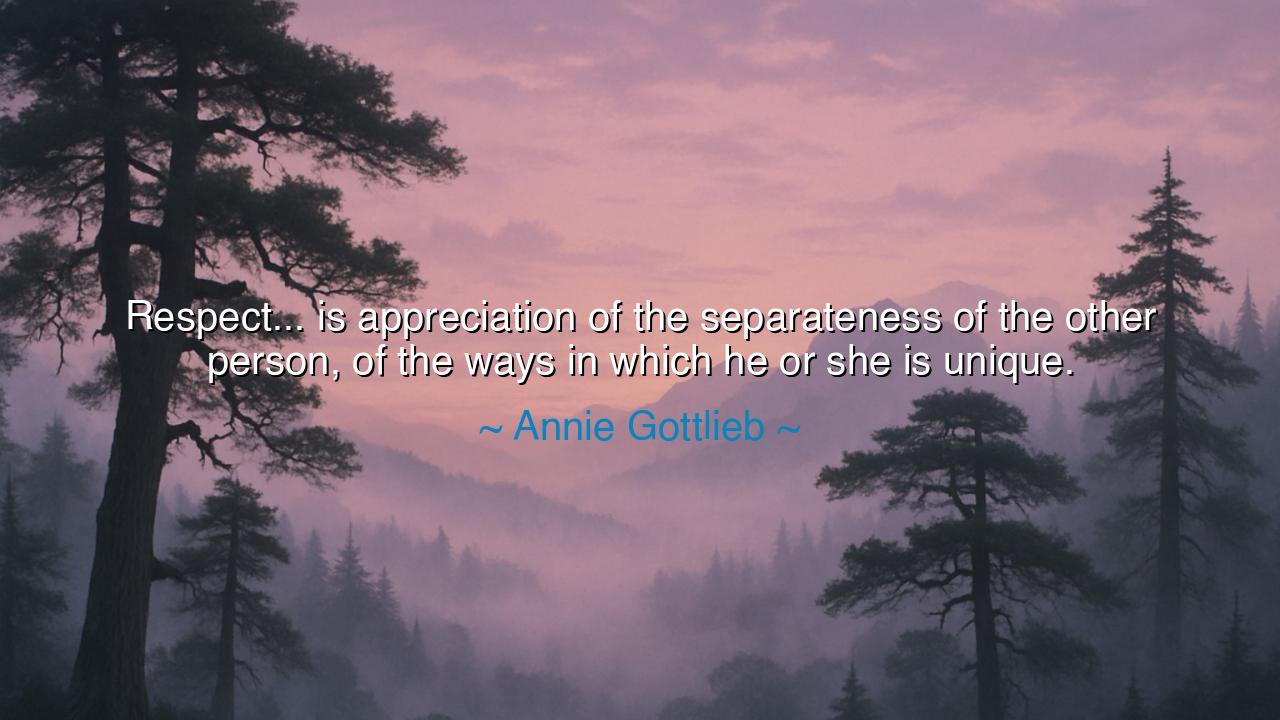
Respect... is appreciation of the separateness of the other
Respect... is appreciation of the separateness of the other person, of the ways in which he or she is unique.






The words of Annie Gottlieb—“Respect… is appreciation of the separateness of the other person, of the ways in which he or she is unique”—speak with the voice of both tenderness and strength. In them lies a profound truth: to honor another is not to mold them into our likeness, nor to demand that they mirror our thoughts and desires. It is to behold their uniqueness, to cherish their differences, and to recognize that their separateness is not a threat but a gift. Respect means giving space for the soul of another to breathe, to flower, to be.
The ancients hinted at this wisdom in their myths and philosophies. The Greeks spoke of the daemon within each person, a guiding spirit that gave individuality and destiny. To crush this was to destroy the very essence of the person. In the East, the sages of Taoism taught that harmony arises not from sameness but from balance—the yin and the yang, each distinct, each necessary. Annie Gottlieb, in her reflection, draws from this same eternal river: respect is not uniformity, but the celebration of separateness.
History offers radiant examples. Consider the friendship between Frederick Douglass, the great abolitionist, and Abraham Lincoln, the president who steered America through its Civil War. They came from utterly different worlds—one, a man born enslaved; the other, a lawyer rising through politics. Yet in their meetings, Lincoln listened with true respect, acknowledging Douglass’s unique voice and perspective. That acknowledgment, that appreciation of difference, gave strength to their shared cause of freedom. Their bond reminds us that respect is not the erasure of difference, but the honoring of it.
Too often, societies have failed in this regard. The tragedies of colonization, slavery, and cultural oppression all stemmed from the refusal to honor the separateness of others. Instead of seeing uniqueness as beauty, the powerful sought to erase, to assimilate, to dominate. The result was not harmony, but destruction and sorrow. Gottlieb’s words are a warning against such arrogance: to truly respect is to resist the impulse to control, and instead to treasure the sacred individuality of every soul.
Yet this principle is not only for nations and history—it is for daily life. Within families, within friendships, within marriages, respect flourishes only when each person is allowed to be fully themselves. Love becomes fragile when it demands sameness, but it grows strong when it honors uniqueness. The husband who listens, the friend who allows silence, the parent who encourages individuality—these embody the spirit of Gottlieb’s teaching. Appreciation of separateness is the soil in which trust and love grow deep.
The lesson is clear: do not fear difference. Do not demand that others think as you think or act as you act. Instead, honor the sacred distance that makes each human soul a universe of its own. Celebrate the fact that no two lives are alike, and that in this diversity lies the richness of existence. True respect is not about agreement, but about recognition—the recognition that every life carries its own song, its own truth, its own flame.
Therefore, let us live as Annie Gottlieb instructs. Let us walk among others with reverence, seeing in their uniqueness not a challenge to our own being, but a complement to it. Let us offer space for others to grow, to change, to stand apart. For in respecting separateness, we build a deeper unity, one that is not fragile conformity, but enduring harmony. And in this harmony, life reveals its fullest beauty, woven not of sameness, but of infinite, sacred difference.






AAdministratorAdministrator
Welcome, honored guests. Please leave a comment, we will respond soon